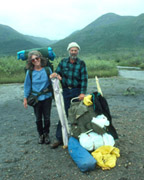Compassionate Water Tanks
Bert Gildart: Today, I want to follow up on my thoughts about illegal immigration in Arizona’s Organ Pipe Cactus National Monument, essentially because I’ve learned so much more about the activity. Several days ago, for instance, I found four huge water tanks in the middle of the desert and have since learned they are called “compassionate water tanks,” meaning their presence is to prevent illegal immigrants from perishing from dehydration. If you follow the news concerning illegal migration from Mexico you know that hundreds die each year.
 COMPASSIONATE WATER TANKS: Specifically, they die along a 261-mile-long stretch of Sonoran Desert, a stretch which contains Organ Pipe Cactus National Monument. This section claimed at least 134 illegal immigrants’ lives last year, more than any other region along the border. As a result, some have taken it upon themselves to install “compassionate water tanks.” My question is: what effect will these attractants have on visitors to this incredible monument?
COMPASSIONATE WATER TANKS: Specifically, they die along a 261-mile-long stretch of Sonoran Desert, a stretch which contains Organ Pipe Cactus National Monument. This section claimed at least 134 illegal immigrants’ lives last year, more than any other region along the border. As a result, some have taken it upon themselves to install “compassionate water tanks.” My question is: what effect will these attractants have on visitors to this incredible monument?
According to a bulletin, a number of areas throughout Organ Pipe are closed and have been closed for the past three weeks. Some of these places are the monument’s most desirable areas.
One of the areas, I later learned, was the one containing the water tanks that I stumbled across while hiking. Other such areas include major drives to sections of scenic splendor Janie and I knew about from previous visits—when these areas were open. They include the Puerto Blanco Drive, the Camino De Dos Republica Road and the Senita Basin Loop, and more.
The Senita loop is one which contains the only senita cactus in the United States, a form of cactus similar to the organ pipe but differing in that it has fewer ribs in each arm. It is an area many visitor would like to see, but can’t—at least right now because it is one of the areas that has been closed for the past three weeks due to drug trafficking, and that brings me to one of the points I want to make.
According to the same bulletin posting areas closed, much of the illegal traffic exists because of the flow of illegal immigration. “…because of illegal immigration, other unlawful acts do occur within the monument… They may drive a stolen vehicle or they may hire human ‘mules’ to carry their contraband in homemade backpacks…”
Further down the bulletin, we’re informed that “people in distress may ask for water” The bulletin further advises you to use “ good judgment in providing water.”
 MATHEW FOSTER: I suspect I’m like many and certainly do not want to see a person die because he or she has entered the United States seeking a better quality of life. If I encountered such a person and he or she were in distress, I know I would help. However, that does not mean I understand making such attractions available. In other words, I not sure I understand why problems in Mexico should become our problems.
MATHEW FOSTER: I suspect I’m like many and certainly do not want to see a person die because he or she has entered the United States seeking a better quality of life. If I encountered such a person and he or she were in distress, I know I would help. However, that does not mean I understand making such attractions available. In other words, I not sure I understand why problems in Mexico should become our problems.
As I walked around the tanks it was easy to determine that each contained water. They were huge, probably about twice the size of the 30 gallon fuel drum we carry in our johnboat in Montana, meaning that this station offered illegal immigrants about 200 gallons. Interestingly, a sign was posted saying:
This Water Station Dedicated to Mathew Michael Foster Moore. June 12, 1979 to May 31, 2003.
Later I asked several park service employees just who was this Mr. Moore, but no one seemed to know.
DEPARTING: That night at one of the evening program, the speaker said the stations had been placed here by several religious organizations, and that the politics of their removal could be considerable.

And so we depart this beautiful desert park, having more questions than what we had when we arrived. We’re bound now for our home in Montana where we’ll travel regionally (meaning the great northwest) for awhile. We have much to contemplate, and perhaps as we read more and prepare for our next grand travel adventure, our perspectives will crystallize.


March 29th, 2007 at 2:53 am
That’s an amazing amount of water. How would immigrants find them – are they close to major roads, on a hill, signed in Spanish? The problem should really be solved prior to them reaching the desert shouldn’t it.
Is it really Mexico’s problem though? America has an unusually high standard of living when compared to much or most of south America. It does become our problem.
Thanks for the great photos once again. I enjoy flicking around you site and seeing areas I probably will never see.
April 18th, 2014 at 11:45 am
No matter what the persons situation , water is the least of things that could be offered that person. It is just the right and human thing to do. God bless the ones responsible for supplying this water.